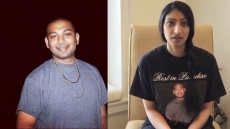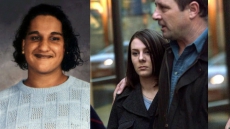OTTAWA — The first person to obtain a legally sanctioned, medically assisted death in Canada, outside Quebec, still didn't get her wish to die peacefully at home.
Even though she had a judge's approval, Hanne Schafer could not find a doctor in her hometown of Calgary to help her die.
Consequently, her husband, Daniel Laurin, says they had to fly to Vancouver, where two doctors agreed to help Schafer end her suffering from amyotrophic lateral sclerosis, which had robbed her of mobility, speech and the ability to do anything for herself, including eat.
Moreover, Laurin says the lethal drug combination injected into Schafer had to be ordered from Switzerland because a local pharmacist could not be found who would provide the drugs.
Schafer's experience underscores the difficulty in ensuring that Canadians who are legally eligible for medical assistance in dying will actually be able to get it.
The federal government has proposed a new law governing assisted dying which does not compel medical practitioners to participate; the government intends to work with the provinces to set up a network of those who are willing to help people die.
"(Hanne) shouldn't have had to go through all that stuff," Laurin said Monday in an interview.
"She wanted to die here in her own house ... She was comfortable here. She was happy here."
The Supreme Court struck down the ban on medically assisted dying last year but gave the federal government a year — later extended to June 6 — to craft a new law that recognizes the right to assisted death for clearly consenting adults with "grievous and irremediable" medical conditions who are enduring physical or mental suffering that they find intolerable.
Until a new law is in place, the top court decided in January to allow court-ordered exemptions for people who met its criteria.
Schafer, a 56-year-old psychologist, died in early March after receiving the first exemption outside Quebec, the only province with its own law on assisted dying.
The federal government last month introduced a bill that takes a more restrictive approach than the Supreme Court. It would require a person to be a consenting adult, at least 18 years of age, in "an advanced stage of irreversible decline" from a serious and incurable disease, illness or disability and for whom a natural death is "reasonably foreseeable."
Laurin said he's not sure whether his wife would have qualified for an assisted death under the proposed new law since it was not clear how close she was to death. Her doctors thought she had six months but she could have lived another five years, he said.
Gary Bauslaugh, author of a book on 42 Canadians who've sought the right to a medically assisted death since 1941, has analysed the circumstances of each of those individual's medical condition. Of the 35 for whom he had enough information to make a realistic assessment, Bauslaugh said he believes 28 of them — 80 per cent — would not have been eligible for an assisted death under the new law.

In his opinion, that includes ALS sufferer Sue Rodriguez, who unsuccessfully took her fight for an assisted death all the way to the Supreme Court in 1993.
"Her death wasn't imminent," Bauslaugh said in an interview. "She was just about to be paralysed and trapped in her body."
The proposed law would help those who are near death but he said it does nothing for those who need it most: the people who face years of intolerable suffering.
In testimony Monday before the House of Commons justice committee, Justice Minister Jody Wilson-Raybould acknowledged that the reasonably foreseeable death provision has sparked considerable controversy. She defended the provision, saying it "provides a fair way to restrict eligibility without making assisted dying available to almost everyone."
She ruled out allowing each individual to choose when their life becomes intolerable.
"Our government firmly believes that medical assistance in dying should not be available for any and all types of suffering," Wilson-Raybould told the committee. "If that was the case, the risk to vulnerable peoples would be greatly increased and frankly would be unacceptable."
Health Minister Jane Philpott told the committee that the bill would make assisted dying a medically necessary service that all provinces would be obliged to provide. She said she'll work with the provinces to figure out exactly how they are to ensure access to the service while allowing medical practitioners to opt out for conscience reasons.
The bill would also allow nurse practitioners, as well as doctors, to provide assisted dying, which Philpott said would help ensure access in remote areas.




